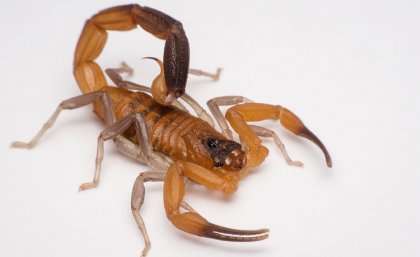Rhopalurus junceus is described as a blue scorpion due to the colouring in its tail. Credit: University of Queensland
Canadian health and wellness company PreveCeutical Medical Inc. (PMI) has signed a research and option agreement with UniQuest, The University of Queensland's main commercialisation company, to develop stabilised natural and synthetic peptides from scorpion venom for immune-boosting applications.
PMI has an interest in the preventative health sector and is developing products derived from Caribbean blue scorpion venom for the nutraceutical and pharmaceutical market.
This includes the CellB9 Immune System Booster product, which contains peptides that are obtained from the Caribbean blue scorpion.
In collaboration with UniQuest, PMI aims to identify the active peptides that provide immune-boosting and tumor-selective painting properties, develop synthetic versions of the active peptides and ultimately identify other therapeutic applications.
UniQuest CEO Dr Dean Moss said the project was based on the research of Dr Harendra (Harry) Parekh, of UQ School of Pharmacy, who will be collaborating with PMI.
"UQ's School of Pharmacy has unique intellectual property in stabilising therapeutic peptides and is in a position to add value by extending PreveCeutical's product line," Dr Moss said.
"This agreement exemplifies the quality of UQ's intellectual property and the willingness of its researchers to engage globally with industry to develop new products through university-industry collaborations."
PMI Chairman and Chief Executive Officer Stephen Van Deventer said working with UniQuest and UQ presented unique opportunities to develop products that promoted health and wellness.
"Wellness products developed from scorpion venom-derived natural and synthetic peptides have the potential to be applied across a number of therapeutic applications including boosting the immune system," Mr Van Deventer said.
Provided by University of Queensland






















